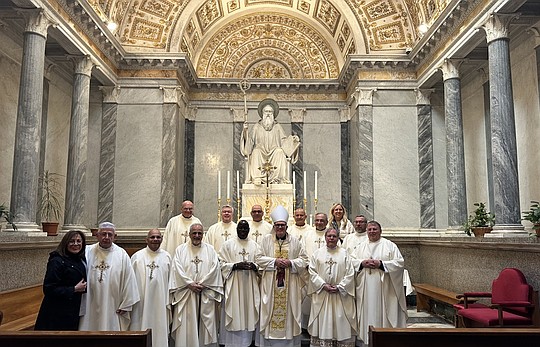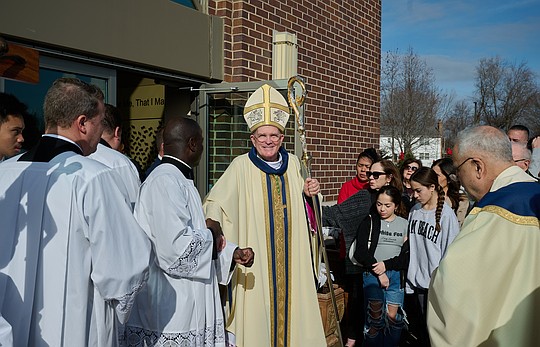How even a short drive can be a faith gift to your kids
February 17, 2023 at 4:29 p.m.

Throughout my childhood, those minutes or hours locked within the close confines of a moving vehicle were considered family time, and they spurred some of the most impactful conversations of my life. A captive audience in more ways than one, here kids must face questions and concepts head on, with even the smartphone escape route blocked by fear of car sickness. These drive-time talks can veer off in any direction, often taking turns that no GPS can predict.
To see a parent casually toss that time aside, plopping their children in front of yet another screen rather than engaging with them, strikes me as a missed opportunity to strengthen familial bonds, to impart wisdom to the next generation and to encourage a curious mind.
[[In-content Ad]]
This is not to say I never took those times for granted as a kid; I did. But now I can see that even the briefest driving conversation – perhaps a ride up to the supermarket – presented a chat-filled wealth of information that has influenced the person I grew into. Sometimes it was as simple as playing a song over and over, as we analyzed it together – noticing an almost hidden guitar line here, or a melismatic backup singer there, with each replay.
Other times the conversations might have gone deeper to explaining an aspect of the world, or a faith perspective that I, as a child, may never have considered.
For example, on one particularly rainy day when we were stuck in bumper-to-bumper traffic, my mother noted how the rain that fell was the same water that has been on earth since the very beginning. "It is the same water that God placed on the world in Genesis, that Moses parted in Exodus and that Christ was baptized in by John the Baptist."
That Christ sanctified the waters through his full immersion in it was a formative idea for me, one that continues to influence the way I view and approach the environment. Surely a sacred intention from the Son of God will never diminish, which suggests that the waters of the Jordan remain sanctified by the Savior. These waters evaporate and move great distances high up in the atmosphere, falling back down upon the land to nourish the vegetation, cleanse the seas, support our lives with the blessing of Jesus Christ.
The mere fact that I can remember such a conversation nearly 20 years later is a testament to the impact it had on me. This lasting impression shows the value of conversations between parents and children. Letting your child pick your brain helps them develop a respect for your knowledge and the hard-won wisdom forged by the many mistakes and failures made in our lives. Conversely, it gives parents an opportunity to understand and guide the thought processes of their children.
So, the next time you’re in the car, I implore you, forego the gadgets and leave the TV off. Ask your kids questions and listen to their responses. They may even thank you for it … 20 years from now.
J-P Mauro is an award-winning writer and cultural editor for Aleteia.org, where this piece first appeared.
Related Stories
Friday, January 02, 2026
E-Editions
Events
Throughout my childhood, those minutes or hours locked within the close confines of a moving vehicle were considered family time, and they spurred some of the most impactful conversations of my life. A captive audience in more ways than one, here kids must face questions and concepts head on, with even the smartphone escape route blocked by fear of car sickness. These drive-time talks can veer off in any direction, often taking turns that no GPS can predict.
To see a parent casually toss that time aside, plopping their children in front of yet another screen rather than engaging with them, strikes me as a missed opportunity to strengthen familial bonds, to impart wisdom to the next generation and to encourage a curious mind.
[[In-content Ad]]
This is not to say I never took those times for granted as a kid; I did. But now I can see that even the briefest driving conversation – perhaps a ride up to the supermarket – presented a chat-filled wealth of information that has influenced the person I grew into. Sometimes it was as simple as playing a song over and over, as we analyzed it together – noticing an almost hidden guitar line here, or a melismatic backup singer there, with each replay.
Other times the conversations might have gone deeper to explaining an aspect of the world, or a faith perspective that I, as a child, may never have considered.
For example, on one particularly rainy day when we were stuck in bumper-to-bumper traffic, my mother noted how the rain that fell was the same water that has been on earth since the very beginning. "It is the same water that God placed on the world in Genesis, that Moses parted in Exodus and that Christ was baptized in by John the Baptist."
That Christ sanctified the waters through his full immersion in it was a formative idea for me, one that continues to influence the way I view and approach the environment. Surely a sacred intention from the Son of God will never diminish, which suggests that the waters of the Jordan remain sanctified by the Savior. These waters evaporate and move great distances high up in the atmosphere, falling back down upon the land to nourish the vegetation, cleanse the seas, support our lives with the blessing of Jesus Christ.
The mere fact that I can remember such a conversation nearly 20 years later is a testament to the impact it had on me. This lasting impression shows the value of conversations between parents and children. Letting your child pick your brain helps them develop a respect for your knowledge and the hard-won wisdom forged by the many mistakes and failures made in our lives. Conversely, it gives parents an opportunity to understand and guide the thought processes of their children.
So, the next time you’re in the car, I implore you, forego the gadgets and leave the TV off. Ask your kids questions and listen to their responses. They may even thank you for it … 20 years from now.
J-P Mauro is an award-winning writer and cultural editor for Aleteia.org, where this piece first appeared.










